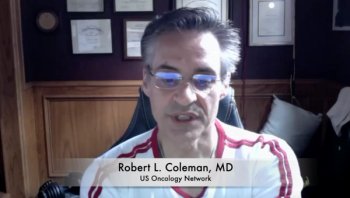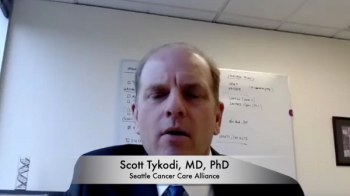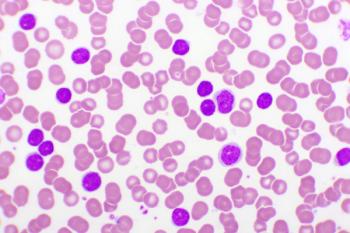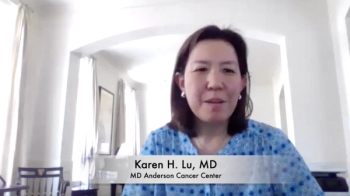
The MD Anderson Cancer Center expert discussed next steps in the evaluation of ivosenidib plus venetoclax, with or without azacytidine, in patients with IDH1-mutated acute myeloid leukemia.

Your AI-Trained Oncology Knowledge Connection!


The MD Anderson Cancer Center expert discussed next steps in the evaluation of ivosenidib plus venetoclax, with or without azacytidine, in patients with IDH1-mutated acute myeloid leukemia.

Takeda Pharmaceutical Company Limited announced the FDA granted pevonedistat, its investigation NEDD8-activating enzyme inhibitor, breakthrough therapy designation to treat patients with higher-risk myelodysplastic syndrome.

The FDA granted breakthrough therapy designation to osimertinib for the adjuvant treatment of patients with early-stage epidermal growth factor receptor-mutated non-small cell lung cancer after complete tumor resection with curative intent.

Marking the first US applications for pembrolizumab in breast cancer, the applications are based on data from the KEYNOTE-355 and KEYNOTE-522 trials, respectively.

The US Oncology expert reported that secondary surgical cytoreduction may not lead to improved outcomes in women platinum-sensitive, recurrent ovarian cancer.

In addition to being approved to detect the HER2 biomarker in breast cancer, the assay was approved as a companion diagnostic for trastuzumab therapy.

These findings have serious implications for future cancer care and underscore the need to resume cancer care and screening.

The FDA granted breakthrough therapy designation to MK-6482 for the treatment of patients with von Hippel-Lindau disease-associated renal cell carcinoma and orphan drug designation to MK-6482 for von Hippel-Lindau disease.

Updated findings further evaluate the effectiveness of various treatments of COVID-19 for patients with cancer and reveal possible racial disparities in enrollment of clinical trials.

A recent study found a 22% lower risk in developing colorectal cancer in the 3 years after patients took hypertension medications to treat high blood pressure, heart failure, or heart disease.

Black Diamond Therapeutics announced that the FDA granted fast track designation to BDTX-189 for the treatment of adult patients with solid tumors harboring an allosteric HER2 mutation or an EGFR or HER2 Exon 20 insertion mutation.

The study is evaluating poziotinib in patients who were previously treated for non-small cell lung cancer with HER2 exon 20 insertion mutations.

Within this study, satisfaction was markedly higher in those treated with apixaban, and adherence rates appeared to be similar between both modalities in women undergoing surgery for gynecologic cancer.

This research suggested the need for reassessment of the methods by which childhood cancer treatment delivery are approached during crises.

Though a significant shift in coverage frameworks was detected in this study, future research should continue to monitor coverage and its possible impact on test utilization.

Using acupuncture to help manage pain associated with cancer treatment, may offer additional tools to help manage function and quality of life in survivors, according to Jun J. Mao, MD, MSCE.

This data may help to inform future recommendations for surveillance of BRCA1/2-associated cancers, according to researchers.

The MSK expert discussed how pre- and post-genetic testing online education made patients more knowledgeable about genetic testing.

The Seattle Cancer Care Alliance expert discusses key takeaways from cohort a of the KEYTRUDA-427 study, evaluating pembrolizumab monotherapy in patients with clear cell renal cell carcinoma.

The agent is now the first and only approved CAR T-cell therapy to treat adult patients with relapsed or refractory mantle cell lymphoma.

Though the video did not have a statistically significant impact, those assigned to watch the video appeared to be more informed about hospice care and reported more favorable perceptions of hospice.

The expert from the Fox Chase Cancer Center discussed a paper recently published regarding alternative multidisciplinary management options for patients with NSCLC during the COVID-19 pandemic.

The MD Anderson Cancer Center expert spoke about the efficacy of ivosenidib plus venetoclax, with or without azacytidine, in patients with IDH1-mutated acute myeloid leukemia.

A study of individuals in Ohio who were uninsured or had Medicaid insurance at the time of their cancer diagnosis suggested that Medicaid expansion is correlated with a narrowing of a critical cancer outcome disparity.

These findings suggested that instituting annual breast cancer screening with MRI earlier may reduce breast cancer mortality by at least 50% in survivors of childhood cancer.

The study is evaluating ruxolitinib in patients with refractory or steroid-dependent chronic graft-versus-host disease compared to best available therapy.

These results indicated the necessity for providers to address the concerns of AYAs with cancer, including those of a spiritual nature.

Both patients and clinicians agreed that preferences related to quality-of-life should be considered in treatment decision making, though barriers still remain.

These results suggest the need for future studies to examine scalable interventions to improve fatigue in women with gynecologic cancers.

The MD Anderson Cancer Center expert discussed further research in delivering online accessible genetic testing.